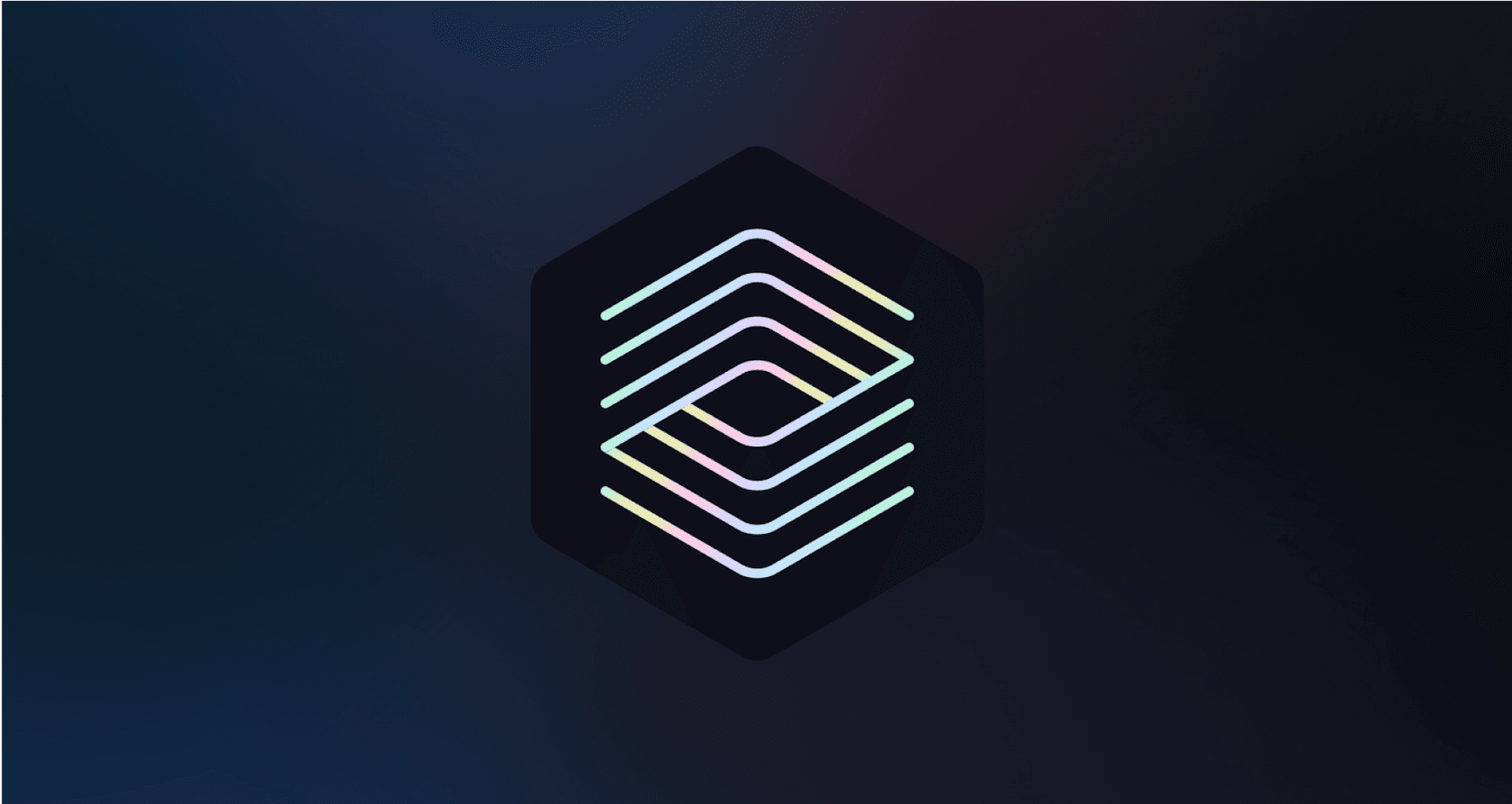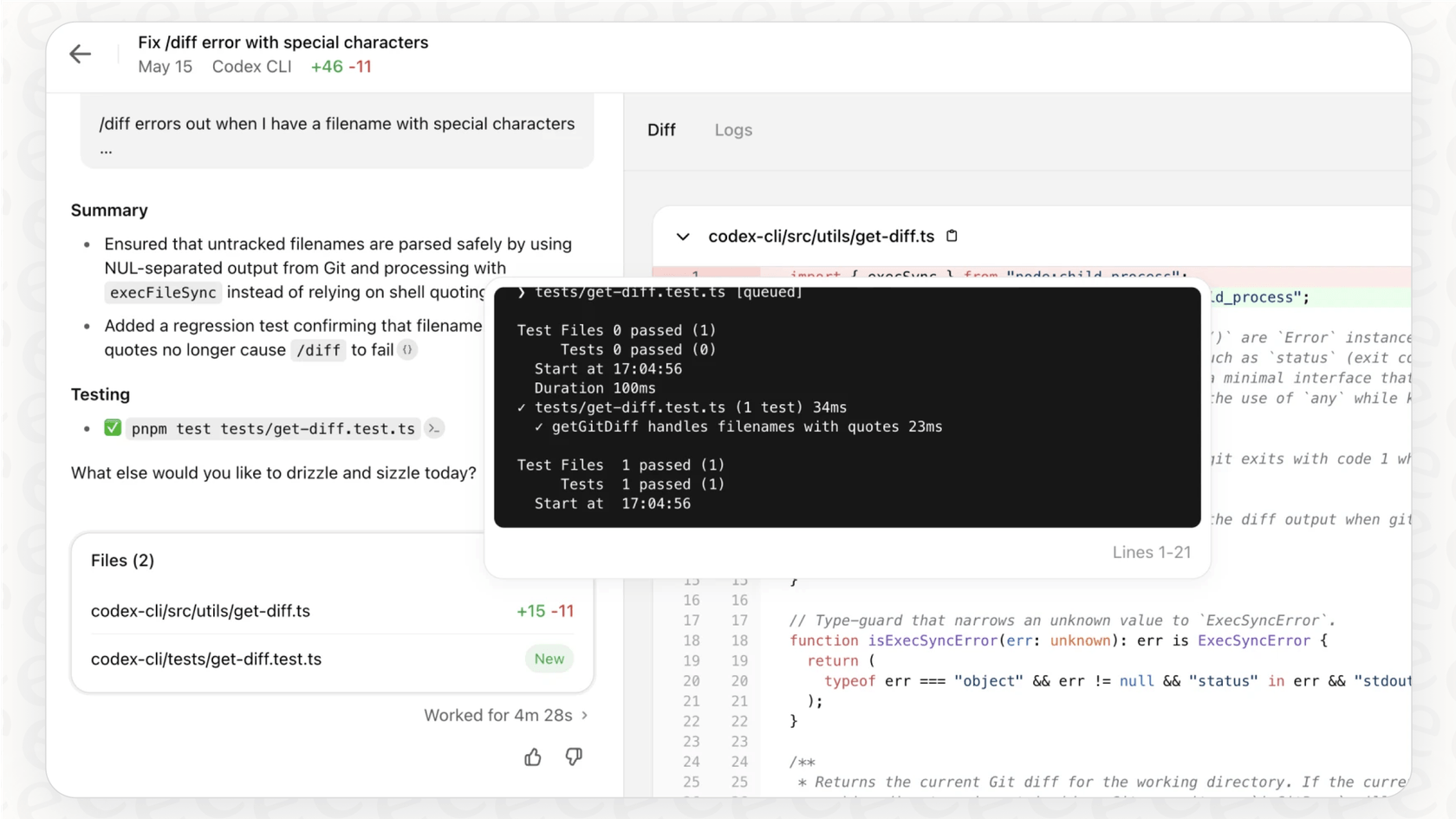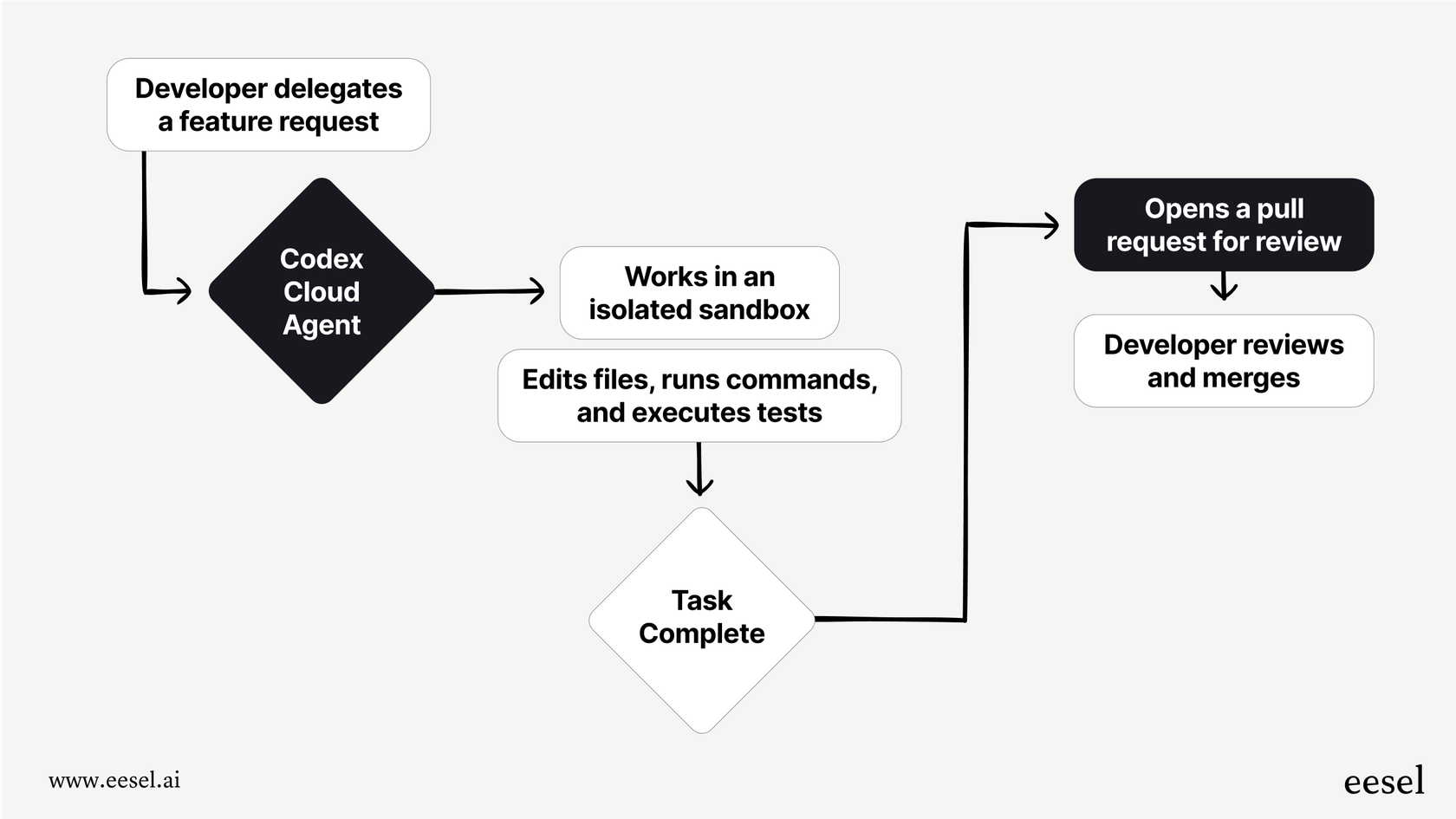
You’ve probably heard the term "vibe coding" floating around. It’s the idea that you can build software just by describing what you want in plain English, and an AI agent goes off and does the heavy lifting. It writes the code, runs the tests, and gets everything ready to go. A few years back, this was straight out of a sci-fi movie. Now, it's actually starting to happen.
Tools like OpenAI Codex and platforms such as Replit are at the heart of this change. They're giving developers some serious new capabilities, letting them turn ideas into working applications way faster than before. But what does that really look like day-to-day? Is it as simple as asking an AI to build your next startup for you?
Let's cut through the hype. This guide will give you a straightforward look at how these tools work together. We’ll cover what’s possible, dig into the real-world limitations that often get glossed over, and show you how the same idea of AI automation can be used beyond coding to help other parts of your business, like customer support.
What are OpenAI Codex and Replit?
To get how these tools fit together, it helps to know what each one does on its own. They have very different jobs, but they combine to create a pretty powerful workflow for building software today.
What is OpenAI Codex?
OpenAI Codex is an AI system from OpenAI that turns natural language into code. If you’ve ever used GitHub Copilot, you’ve seen an earlier version of this technology. But the latest Codex is more than just a fancy autocomplete, it’s a more independent software engineering agent that works inside ChatGPT.
You can ask it to build new features, track down a stubborn bug, or just explain a piece of code that’s giving you a headache. It works on its own inside a secure, contained environment to get the task done. It’s comfortable with over a dozen languages, including Python, JavaScript, and Go, which makes it a useful partner for all sorts of projects.

What is Replit?
Replit is an online, browser-based Integrated Development Environment (or IDE). Just think of it as a complete coding environment that runs in a browser tab. You can write, run, and host code in pretty much any language without installing anything on your own computer.
It's really popular for its collaboration features, which let multiple developers jump into the same environment and work together in real-time. Replit also has its own AI assistant built-in, making it a favorite for millions of developers who need to get apps built and launched quickly.
How OpenAI Codex and Replit work together for developers
The word "integration" can be a little confusing here. There isn't a single button you press to connect Codex and Replit. It’s more of a modern workflow where developers use Codex to generate code, which they then manage and deploy using a platform like Replit.
Here's how that usually plays out:
-
The Prompt: A developer kicks things off in ChatGPT, giving Codex a task. It might be something like, "Build a user authentication page with email and password fields for my Node.js app."
-
The AI Gets to Work: Codex starts working in its own secure environment. It looks at the existing code in the connected GitHub repository, writes the new feature, and even runs some tests to make sure it didn't break anything.
-
The Pull Request: Once it's done, Codex opens a pull request on GitHub and includes comments explaining the changes it made.
-
The Human Review: The developer then looks over the AI-generated code, just like they would with a human teammate. They check the quality, make any small adjustments, and merge the changes.
-
Deployment: From there, the updated code can be pulled from GitHub into a Replit workspace. The developer can keep building on it, run more tests in a live environment, and finally deploy the app for people to use.
This workflow lets developers hand off some of the more repetitive coding tasks to an AI, freeing them up to focus on the trickier, more strategic parts of the job. It's less about replacing developers and more about giving them a brilliant, and ridiculously fast, assistant.

The real-world limitations
While that all sounds great, it's good to keep expectations in check. These tools are definitely powerful, but they have some practical limits that are important to understand before you jump in.
-
You need to know what you’re doing: Let's be honest, tools like Codex are made by engineers, for engineers. To get anything useful out of them, you need a decent understanding of coding, how GitHub works, and how to write a good prompt. Someone from your marketing or support team probably can't justpick it up and build an internal tool. They are not ideal for pure no-coders.
-
It's not exactly plug-and-play: Getting an AI agent to work correctly on a custom codebase takes some effort. You often have to do some careful setup, like creating special "AGENTS.md" files to give the AI instructions or configuring complex MCP servers to feed it the right context. It’s not a simple switch you can flip; it takes real technical work.
-
It doesn't know your business: This is the biggest hurdle. Codex has been trained on billions of lines of public code from places like GitHub. It knows how to write a function, but it has no idea about your company’s internal policies, your customers' specific problems, or the little details of your business logic. It can build a generic password reset page, but it can't handle a refund request that needs to follow your company's specific return policy.
Beyond coding: Autonomous AI for support and internal operations
The idea behind Codex is a big deal: an independent agent that can understand a request, look at a source of knowledge (a codebase), and take action (write code). That same model is incredibly useful for non-technical teams, but they need a tool that's built for their world.
This is where the principles of AI automation move out of the code editor and into your help desk. For teams in customer support, ITSM, or internal knowledge management, you need a different kind of agent, one that thinks in tickets and knowledge bases, not functions and pull requests.
-
From a codebase to a knowledge base: Codex connects to a GitHub repo to understand a project. In the same way, an AI support agent like eesel AI connects to your company’s actual sources of truth. It plugs right into your help desk (Zendesk, Freshdesk), internal wikis (Confluence, Google Docs), and even your team's conversations in Slack. It learns from your real past customer conversations, not generic public data.
-
From a sandbox to a simulation: Developers use a sandbox to safely test code. But how do you test an AI that's going to talk to your customers without any risk? eesel AI handles this with a simulation mode. You can run the AI on thousands of your past support tickets to see exactly how it would have responded. You'll know what it would have solved and what it would have passed on to a human. This gives you a clear, data-backed preview of its performance before it ever touches a live customer chat.
-
From a complex setup to a 5-minute go-live: The developer-focused setup for Codex is powerful, but it's also time-consuming. On the other hand, eesel AI is built to be set up by anyone. You can connect your help desk, train the AI on your knowledge, and have it running in minutes, all without writing a single line of code or sitting through a sales demo.
While both are autonomous agents, they’re built for completely different jobs.
| Feature | OpenAI Codex for Developers | eesel AI for Support Teams |
|---|---|---|
| Primary Goal | Autonomously write, test, and fix code. | Autonomously resolve support tickets and answer questions. |
| Knowledge Source | GitHub repository and public code. | Help desk tickets, knowledge bases, docs, Slack. |
| Testing Environment | Secure, sandboxed coding environment. | Risk-free simulation on historical tickets. |
| Setup & Onboarding | Technical configuration; requires dev expertise. | Self-serve; go live in minutes with one-click integrations. |
| User Interface | Prompts in ChatGPT and CLI. | Simple dashboard with prompt editor & workflow rules. |
This tutorial explains how non-technical users can use OpenAI's Codex to build and modify websites without writing code.
Pricing: OpenAI Codex vs. Replit
So what does it cost to get this developer workflow up and running? You'll likely need a subscription for both services.
-
OpenAI Codex: Access is part of the ChatGPT Pro subscription, which runs $20/month per user. If you plan on using the API heavily, you might have additional costs based on usage.
-
Replit: Replit does have a free tier, but for the full power of its AI Agent and other pro features, you'll want the Core plan. This also costs $20/month and includes hosting credits.
For a developer wanting to take full advantage of this AI-assisted workflow, the total would be around $40 per month.
Choosing the right AI agent for the job
OpenAI Codex and Replit are changing what’s possible in software development. They represent a huge step forward in turning ideas into working code faster than ever. For developers, this kind of workflow is quickly becoming a standard part of the toolkit.
But this technology, as impressive as it is, is highly specialized. Its focus on code makes it the wrong choice for automating other important business functions like customer service or internal Q&A.
The real shift isn't about finding one AI that does everything; it's about using specialized AI agents built for specific jobs. For developers, that agent might be Codex. For support and operations teams who want that same level of autonomous power, but without the technical headache and with a deep understanding of their business, the answer is a platform designed for them from day one.
Ready to bring that power to your support team? See how eesel AI can learn from your existing knowledge and start resolving tickets in minutes. Try it for free today.
Frequently asked questions
OpenAI Codex integrations with Replit refer to a workflow where developers use OpenAI Codex to generate code from natural language prompts, and then manage, test, and deploy that code using the Replit platform. This collaboration allows for faster development cycles and automation of repetitive coding tasks.
Typically, a developer prompts Codex in ChatGPT to write code, which then creates a pull request on GitHub. After human review and merging, the code is pulled into a Replit workspace for further development, testing, and deployment. It's a structured process, not a direct, single-button connection.
Key limitations include the need for strong technical proficiency, complex setup processes (like "AGENTS.md" files), and the AI's lack of understanding of specific business logic or internal policies. It's not a plug-and-play solution for non-technical users.
Generally, no. While powerful, OpenAI Codex integrations with Replit require a decent understanding of coding, GitHub, and prompt engineering to be effective. They are designed for engineers and not ideal for pure no-coders or non-technical teams.
To fully utilize OpenAI Codex integrations with Replit, you would typically need a ChatGPT Pro subscription ($20/month) for Codex access and a Replit Core plan ($20/month). This totals approximately $40 per month, plus potential additional API usage costs.
No, OpenAI Codex integrations with Replit are highly specialized for code generation and development workflows. For automating non-coding tasks like customer support or internal Q&A, you would need a different type of AI agent specifically designed for those functions, like eesel AI.
The blog clarifies that "integration" isn't a single button. Instead, OpenAI Codex integrations with Replit describe a developer workflow that involves using Codex for code generation and Replit for managing and deploying that code, often facilitated by GitHub.
Share this post

Article by
Stevia Putri
Stevia Putri is a marketing generalist at eesel AI, where she helps turn powerful AI tools into stories that resonate. She’s driven by curiosity, clarity, and the human side of technology.







